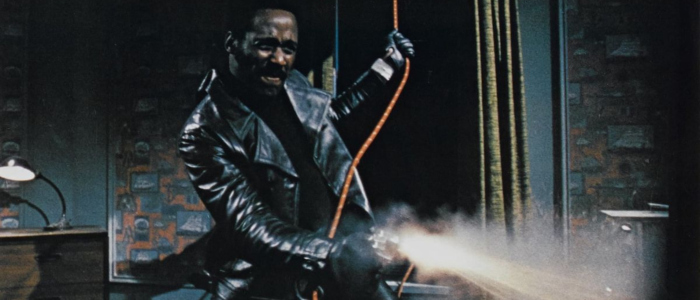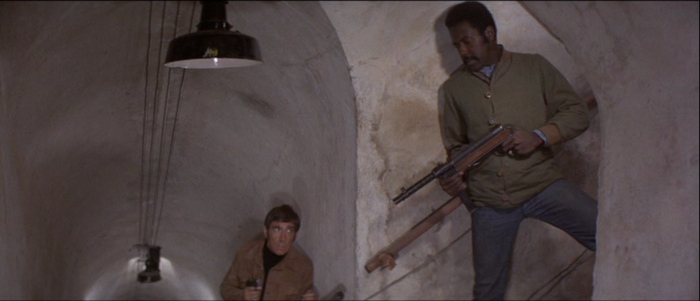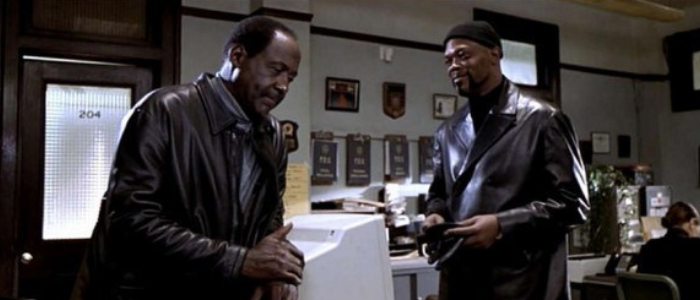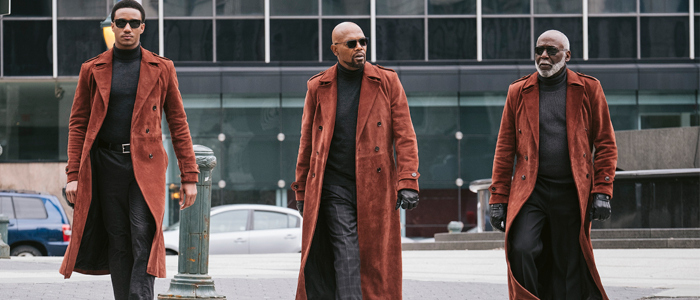Shut Your Mouth: Exploring the 48-Year History of the ‘Shaft’ Franchise

New Shaft films have been in and out of theaters five times over the past forty-eight years, and that’s one hell of an accomplishment for any franchise. It’s made even more impressive and unprecedented, though, by the realization that the same actor has brought John Shaft to life through those five films and across nearly five decades. That’s a feat not even the Star Wars films can claim yet. Richard Roundtree headlines the first three films – Shaft (1971), Shaft’s Big Score! (1972), Shaft in Africa (1973) – and while he’s only a supporting player in the most recent two, both named Shaft (2000, 2019) for Hollywood reasons, his presence is still an important one.
Samuel L. Jackson and Jessie Usher take the lead in those later films as Shaft Jr. and Shaft III, respectively, and with a changing of the guard comes more than a few changes in approach and tone. While two entries in the 70s trilogy fit the mold of the decade’s blaxploitation films with plots involving street thugs and mobsters both black and white, the third takes Shaft on a James Bond-like adventure around the globe. The ones from 2000 and 2019, though, are shaped more for their respective times. Shaft (2000) is a sex-less action/thriller touching on racism and police corruption, while Shaft (2019) is an action/comedy – with an emphasis on the comedy – involving disgruntled military vets, booty, and drug trafficking. They’re entirely different beasts from that original trilogy, but the common thread between them all remains the cool cat whose name is in the title.

John Shaft (Roundtree) is a private eye working the streets of New York City helping people in need. He usually prefers clients close to the right side of the law, but when the head of a black crime organization hires him to find his daughter, he takes the case for the girl’s sake. She’s been abducted by an Italian crime family as part of ongoing turf battles, and while the police and general populace suspect a race war brewing Shaft knows it’s all about business. And he knows how to handle his business.
Shaft (1971) is the one that started it all, and as one of the first blaxploitation films it launched numerous copycats and helped popularize the sub-genre for audiences across races. A few came before and many came after, but while some focused on the black experience in America with drama and serious commentary, most tried to follow in Shaft‘s big footprints by delivering entertainment lined with attitude, mild racial exploitation, violent men, and sexy women.
MGM bought the rights to the original book early – a wise pick-up as the film was largely responsible for saving the flailing studio from having to declare bankruptcy – and director Gordon Parks is the one who cast Roundtree in the lead role. It was the actor’s first feature film, and the idea was to create a fun, thrilling movie that empowered a black man with authority, ability, and intelligence. Instead of glorifying a tough gangster or pimp, Shaft is a hero of sorts standing up for the black community, deriding “the man” at every opportunity (both white and black), wooing the ladies, and winning in the end.
The film features a group of black revolutionaries, but rather than make a grand political statement they exist mostly to help Shaft in his search for the missing girl. Some criticized their presence as mere lip service to the idea of “black power,” and marketing playing up the angle certainly contributed to the idea, but at the end of the day, the film is pure entertainment. I mean, it’s all right there in Isaac Hayes’ Oscar-winning theme song for the film that refers to Shaft as “the black private dick that’s a sex machine to all the chicks.”
Shaft was a different kind of action hero, one who appealed to a wide and diverse audience with a film that found financial success before making its mark in pop culture. It’s a solid urban thriller about a successful black private eye who’s as at home with the powerful as he is with the dregs of society, and it offered a counterpoint for audiences to the year’s other blaxploitation hit, the far angrier Sweet Sweetback’s Baad Asssss Song. It takes concepts and perceptions from black and white film culture and brings them together in a way that appealed to early 70s audiences on both sides of the racial divide, and that’s no small feat.

A phone call in the middle of the night disturbs Shaft’s canoodling with his woman, and he’s surprised to hear her brother on the end of the line. He needs Shaft’s help, but before the private eye can reach him the man’s been killed. The investigation reveals a missing cache of cash and dueling gangsters searching for it, and soon both Shaft and his lady are targeted by competing thugs.
Shaft’s Big Score! (1972) was greenlit pretty quickly after the first film’s success – so quickly that it’s Roundtree’s second feature credit! – and the same team returned for the sequel. Parks once again directed, original author Ernest Tidyman wrote the script, and Urs Furrer returned as cinematographer. Perhaps unsurprisingly, the plot is also similar to its predecessor. “Why rock the boat” was apparently the mantra as Shaft once again finds himself trying to protect someone with Italian crooks on one side and a black gang squeezing in on the other.
It’s familiar, but with twice the budget of the first film’s $1 million the filmmakers were able to give it a more refined look and increase the action quotient. In addition to the expected punches, kicks, and neck chops, the film also delivers a solid car chase – with Shaft riding shotgun while one of his lady friends drives no less – that grows to include a speed boat and a helicopter. It makes for an exciting third act.
Coming so soon on the heels of the first, the sequel has no cause to address a changed audience and having helped kick it off the year prior, the film instead settles into its corner of the blaxploitation market to deliver more of the same. It’s essentially what first sequels continue to do even today – be the same, but bigger – and while it earned slightly less than the first it was still a healthy hit for MGM and landed at #17 on the year’s list of the highest grossing movies.

Shaft isn’t looking for trouble, but when a tall man carrying a big stick breaks into his apartment one morning he most certainly finds it. He’s abducted, stripped, and locked in a room with sand beneath his feet and heat lamps blaring down upon him. It’s a test, and only after passing it is he told that he’s been hired to infiltrate and help bring down a human smuggling ring moving slave labor from Africa to Europe. He’s not too keen at first, but the paycheck and the sexy supporting players sway his attention.
If the one-two punch of the first two films taught viewers anything, it was to expect the expected. Happily, though, depending on your point of view, Shaft in Africa (1973) shakes things up considerably. The film quickly leaves Shaft’s beloved New York City behind with the bulk of the film unfolding in West Africa and France.
Instead of giving audiences what previously worked – and what they presumably wanted more of – the third film makes a direct play for James Bond territory. Shaft’s always been a bed-hopper, obviously, but here he does so as part of a globe-hopping adventure complete with gadgets like a hidden camera in his fighting stick and a femme fatale who’s murdered shortly after enjoying his loving stick. Hell, Shaft even name-drops Bond at one point. Both franchises were MGM properties at the time, and one wonders if a crossover might have been planned had this entry not bombed spectacularly.
Ernest Tidyman’s novels set the basis for the first two films, but while he had a few more in the book series MGM decided to go the original story route with a script by Stirling Silliphant (In the Heat of the Night, 1967; The Poseidon Adventure, 1972). They also chose a new director in John Guillermin (The Towering Inferno, 1974; King Kong, 1976). While 1973 saw plenty of blaxploitation fare in the likes of Black Caesar, Coffy, and Hell Up In Harlem, the decision to go big also meant stepping away from the sub-genre that it first called home. Curiously, this same year saw MGM release the Bond film Live and Let Die which itself dabbles in blaxploitation.
Whatever the reasoning for the big shift, audiences failed to respond. It’s a shame too as, while the film may lack the perceived authenticity of the first two it’s pretty damn entertaining. Sure we get some condemnation and shade thrown towards the slave trade and “modern” societies that look the other way, but we also get some naked stick fighting, camel-riding, and Shaft making a compelling case to a virgin why she shouldn’t consent to a clitoridectomy. And not for nothing, but it’s also arguably the sexiest entry in the franchise thanks in part to the head villain’s sex freak of a moll having a visible reaction and attraction towards Shaft. She’s a determined lady, and Shaft being the gentleman that he is, he eventually relents.

When a young black man is beaten to death outside of a fancy restaurant it’s Det. John Shaft who lands the case. The killer is still on the premises, but while he claims self defense a witness suggests it was a racially motivated crime. The man’s wealthy father and an unjust legal system sees him released on bail, and he immediately jets out of the country. Shaft is ready when he returns, but his attempt to bring the man to belated justice sees him caught in the cross-hairs of a local gang boss.
John Singleton’s Shaft (2000) arrived twenty-seven years after the character’s last big-screen outing, and while it was initially billed as a reboot of sorts it’s actually a sequel. Samuel L. Jackson plays Shaft – supposedly the nephew of Roundtree’s Shaft, but revealed in the newest film as his son – as a man who went into law enforcement despite his namesake’s warnings about its limitations.
With a budget more than twenty times the earlier films the action here is more plentiful, but it’s on par with Shaft’s Big Score! as the weakest and least interesting of the franchise. Jackson is fine, obviously, and there’s no arguing with the supporting cast that includes Christian Bale, Jeffrey Wright, Vanessa Williams, Toni Collette, Dan Hedaya, and a brief appearance by Roundtree, but its arrival in 2000 leaves it feeling like any number of generic 90s thrillers. Tough cop butting up against a seemingly rigged system in his pursuit of justice is a familiar premise, and it almost feels as far removed from the Shaft character as his African adventure did.
What starts as a direct indictment of racist violence and police corruption shifts almost completely into just another tale of a violent street thug causing havoc. Bale’s rich white boy exists on the periphery while Wright’s Dominican drug lord becomes the main villain who eats up most of the screen time (while Wright chews much of the screen). It’s an odd choice as the racist system seems a much more exciting target for a man like Shaft and one more fitting of the times in light of the 90s being home to an increased awareness of police brutality and the L.A. riots.
In case you were wondering where else the film had been neutered, and this can’t be understated, it’s a weirdly sex-less movie too. Despite opening credits that play across shadowy glimpses of bodies writhing, caressing, and rubbing each other there’s not a single sex scene to be found here. It’s suggested that Shaft leaves a bar with a woman as it’s his duty to “satisfy her booty,” but that’s as close as the film comes to acknowledging Shaft’s sex life. No wonder Shaft Sr. pretended not to be his father.

J.J. Shaft is a data analyst with the FBI, and while he doesn’t get much respect from his boss it’s still an accomplishment he’s proud of as the son of a single mother and a father who abandoned them after he was born. When J.J.’s good friend is found dead from a suspicious overdose he’s forced to ask his father for help in investigating the truth, and while they clash in every way imaginable they also work well together.
Like its predecessor, Shaft (2019) is once again a decades-later follow-up that tries to be both a reboot and a sequel, but unlike that 2000 entry and the original trilogy, it’s also a flat-out comedy. The decision to take the Shaft franchise into heavily comedic territory seems like an odd one, especially after the previous entry did a respectable $107 million at the box-office. It’s not surprising, though, and seems to fit in with an observation I made last year regarding the lack of black-led action franchises that are played serious and straight. If you can’t beat ’em, join ’em I guess, and to that end director Tim Story and a pair of screenwriters have delivered the Shaft action/comedy nobody asked for.
I seem to be in the minority in finding it more fun than fail, but it’s easy to see why most critics and audiences are turning up their nose. It’s a film trying to find comedy in the contrast between a modern young professional J.J. and the hard-hitting “pussay” magnet of films past, and for every joke that works two more land awkwardly with a thud. It’s trying to be a Shaft movie even as it pokes fun at Shaft movies, and the balance doesn’t always work.
Jackson reprises his role from the 2000 film, but in a complete turn around from his asexual presence there, his appetites are played up to comical degrees here. When J.J. goes to his office he first meets a topless woman with glitter all over her breasts and cleavage, and when Shaft pops in moments later it’s with glitter all up in his facial hair. Jackson plays it mostly straight which makes it even funnier, and it feels like him truly cutting loose with the character. J.J. teaches Shaft about respecting women, Shaft teaches J.J. about women, period, and everyone goes home happy. The action is treated similarly with J.J. despising guns even as Shaft uses them with abandon.
We know by this point that audiences didn’t turn up for it, but the intention seemed to be to lure them in with a “buddy cop” premise designed after the likes of recent hits Ride Along (2014) or Central Intelligence (2016). Who doesn’t love seeing a mismatched pair forced together to solve a crime? It’s a beloved premise for American action/comedies as a competent tough guy and a nerd/fool come together for laughs and the eventual realization that different strengths are still strengths, but it doesn’t quite feel like a natural fit for a Shaft film. It’s unclear if this was always the intention or if last year’s stylish but empty SuperFly remake gave the studio cold feet about playing the genre too seriously.
If nothing else, the film does bring the franchise full circle by bringing together all three generations of Shaft men for a third-act action set-piece, and while box-office receipts suggest it’s the end of the road for this particular bloodline, I for one wouldn’t bet against them. And yes, I’ll be first in line in 2046 when Lady Shaft opens wide with its story about a female detective who teams up with her father, grandfather, and great grandfather to solve a series of clown abductions in Brazil.
The post Shut Your Mouth: Exploring the 48-Year History of the ‘Shaft’ Franchise appeared first on /Film.
from /Film http://bit.ly/2Rlejzo
No comments: